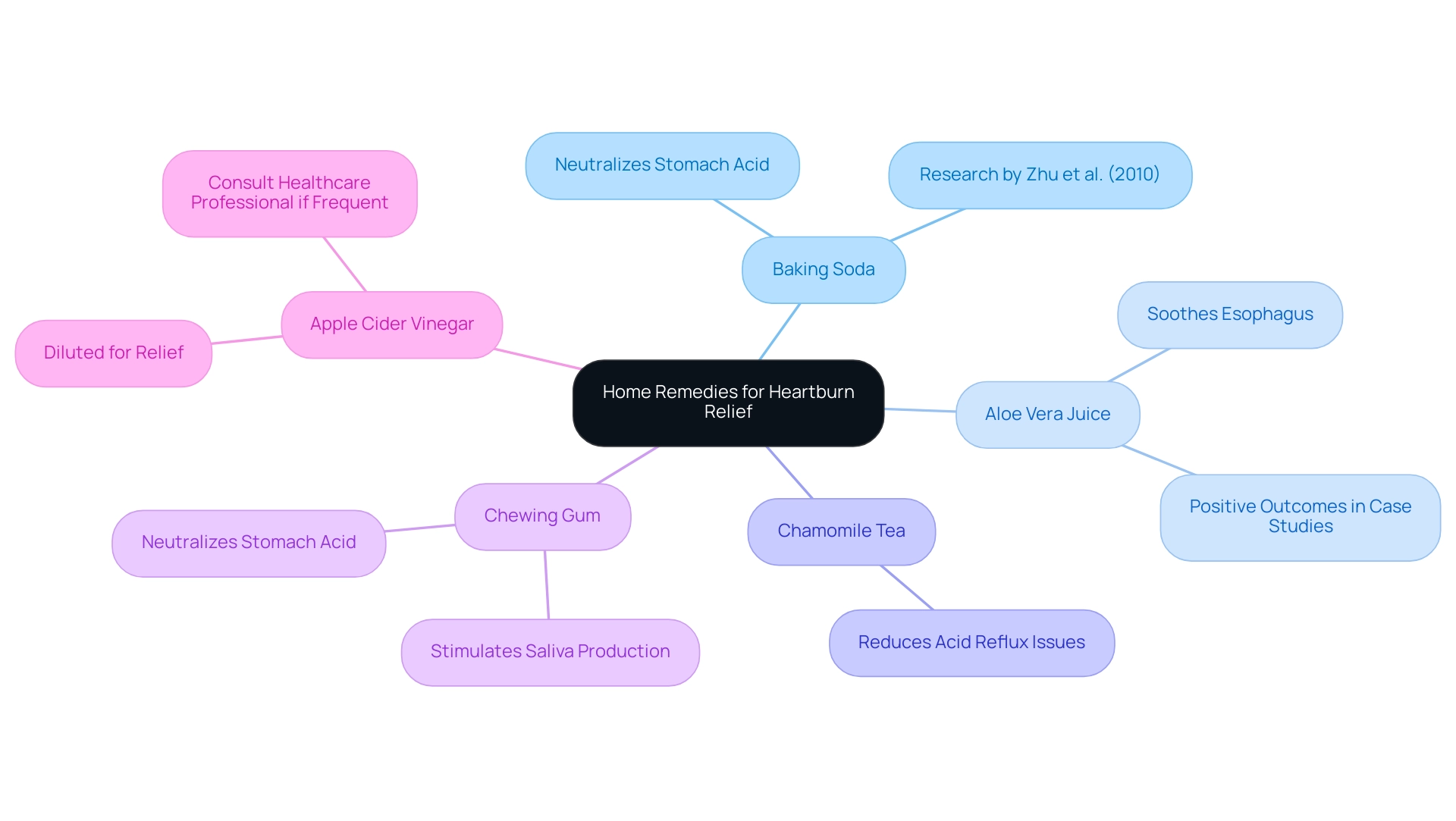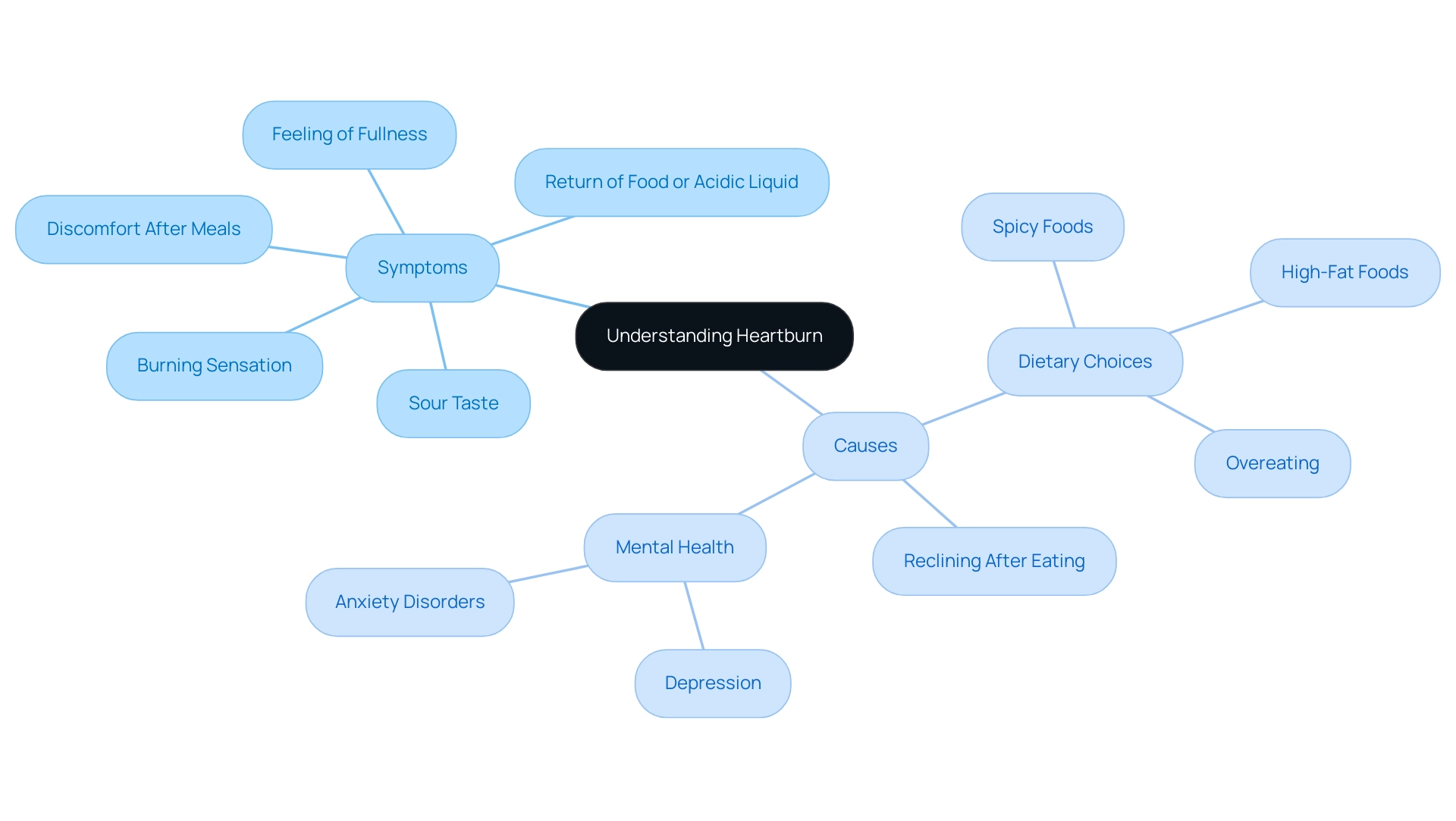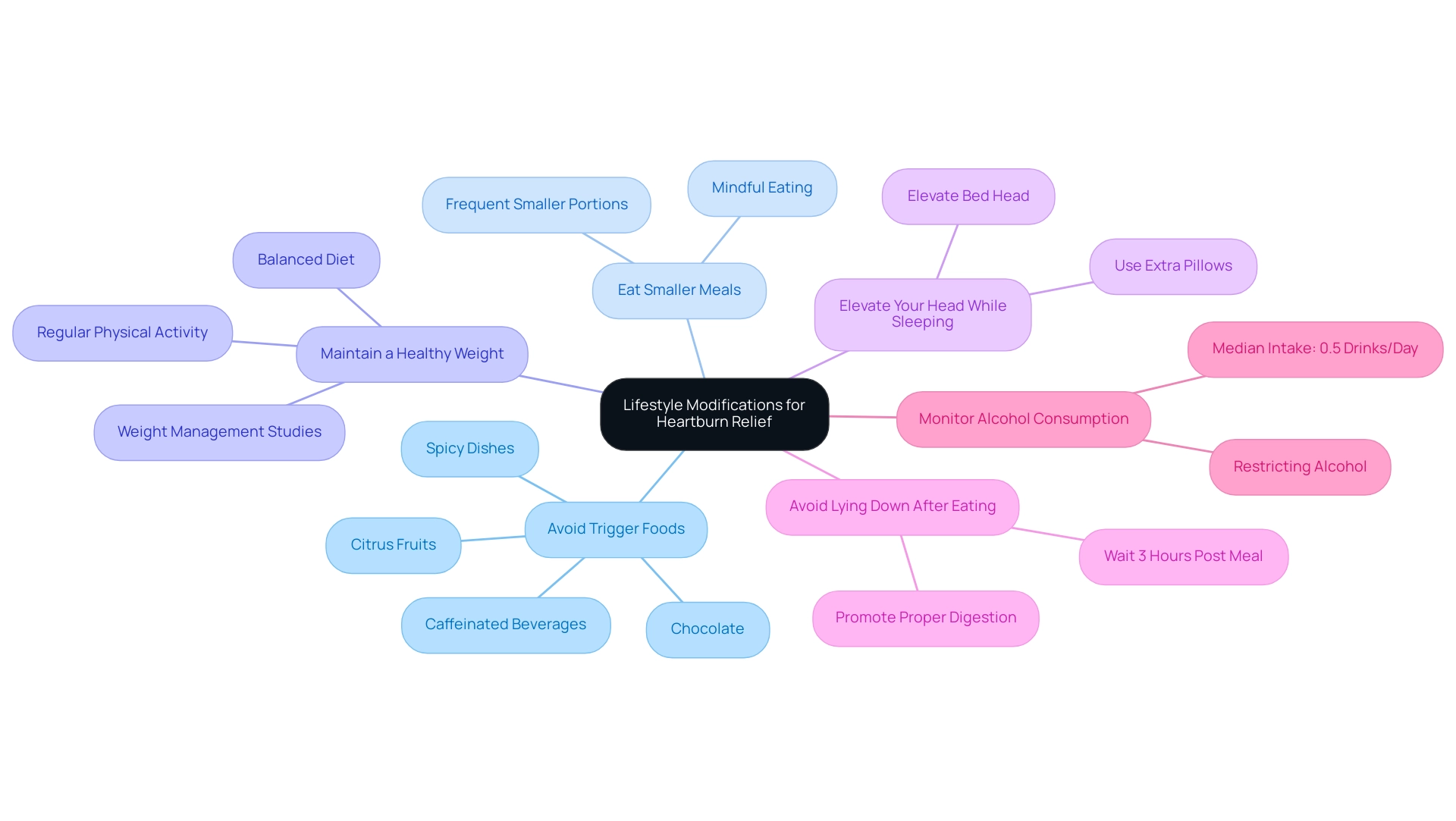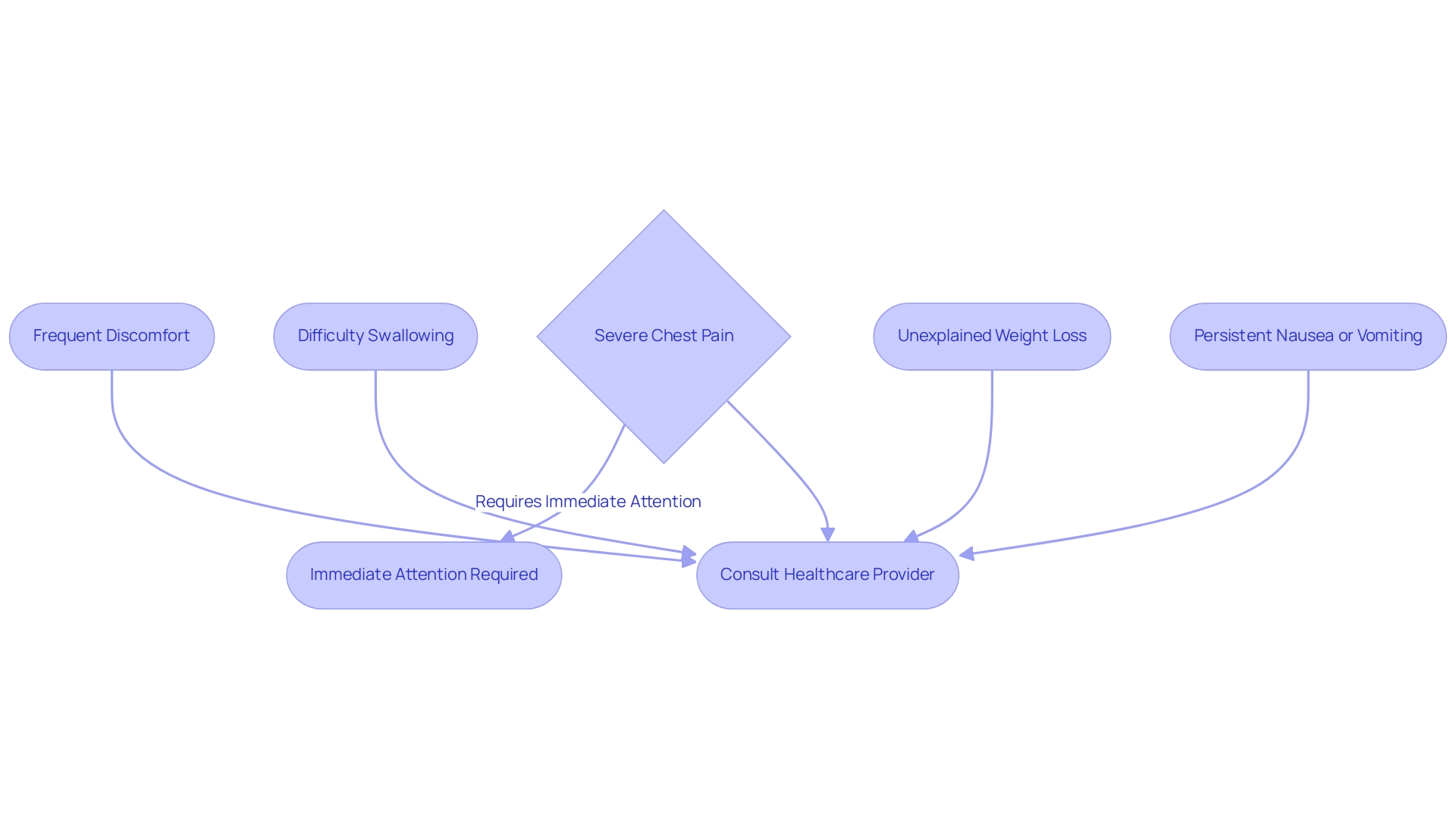Introduction
Heartburn is a common yet often misunderstood condition that can significantly impact daily life. Characterized by a burning sensation in the chest and a sour taste in the mouth, it frequently follows meals and can be exacerbated by dietary choices and lifestyle habits. As awareness of gastroesophageal reflux disease (GERD) grows, understanding the symptoms, causes, and potential triggers becomes essential for effective management.
This article delves into the various aspects of heartburn, including:
- Lifestyle modifications
- Treatment options
- When it is necessary to seek medical advice
By exploring both conventional and natural remedies, individuals can better navigate their path to relief and improve their overall quality of life.
1. Understanding Heartburn: Symptoms and Causes
Heartburn manifests as a burning sensation in the chest, often coupled with a sour taste in the mouth, which can be quite uncomfortable. Common signs include:
- Discomfort after meals
- A feeling of fullness
- The return of food or acidic liquid
The primary mechanism behind acid reflux is the reflux of stomach acid into the esophagus, a condition that can be exacerbated by various factors such as dietary choices—particularly the consumption of spicy or high-fat foods—overeating, and the act of reclining shortly after eating.
Recent studies indicate that an astounding 76.2% of people acknowledge acid reflux as a sign of gastroesophageal reflux disorder, emphasizing the extensive effect of this condition. Furthermore, a study conducted by Umm Al-Qura University, which adhered to the ethical principles outlined in the Declaration of Helsinki, underscores the importance of tailored educational programs to enhance awareness and understanding of gastroesophageal reflux disease among university students. This emphasis on education is vital, as understanding the signs and origins of acid reflux helps individuals identify personal triggers and discover how to get rid of heartburn effectively.
Significantly, recent research also suggests that
mental well-being influences acid reflux, with individuals experiencing depression showing a 46% greater chance of having related symptoms compared to their non-depressed peers. This connection suggests that addressing mental health issues may be essential in managing acid reflux effectively; thus, treatment for GERD should also consider the mental health aspects associated with the condition.
2. Lifestyle Modifications for Heartburn Relief
To effectively manage heartburn, it can be beneficial to learn how to get rid of heartburn by implementing the following lifestyle modifications.
-
Avoid Trigger Foods: Identifying and removing specific foods that cause reactions is crucial. Common culprits include spicy dishes, citrus fruits, chocolate, and caffeinated beverages.
Research indicates that fast eating and consuming foods beyond fullness are significant risk factors for gastroesophageal reflux disease (GERD), emphasizing the importance of mindful eating habits.
-
Eat Smaller Meals: Instead of consuming three large meals, consider opting for smaller, more frequent meals. This approach can help reduce pressure on the stomach, which may be beneficial for those seeking how to get rid of heartburn, potentially easing discomfort and improving digestion.
-
Maintain a Healthy Weight: Excess weight has been associated with heightened symptoms of acid reflux. A balanced diet combined with regular physical activity can assist in weight management, which is essential for lowering the risk of gastroesophageal reflux disease. A study involving 832 patients noted a correlation between effective weight management and decreased occurrences of acid reflux.
-
Elevate Your Head While Sleeping: Elevating the head of your bed or using extra pillows can prevent acid reflux during the night. This simple adjustment may significantly improve sleep quality and reduce nighttime symptoms.
-
Avoid Lying Down After Eating: It is advisable to wait at least three hours after a meal before lying down. This practice allows for proper digestion and minimizes the risk of reflux, providing insight into how to get rid of heartburn, as recommended by recent dietary guidelines.
-
Monitor Alcohol Consumption: The median alcohol intake among individuals is reported at 0.5 standard drinks per day, with a range of 0.05–2.1. Restricting alcohol can also contribute to managing discomfort symptoms.
Implementing these lifestyle adjustments not only helps in addressing this issue but also corresponds with expert views promoting comprehensive dietary changes. According to Simone Harrison, a research fellow supported by Queensland Health, lifestyle adjustments play a critical role in symptom management. By incorporating these strategies, individuals can significantly enhance their digestive health and improve their quality of life while managing discomfort.
3. Medications and Natural Remedies for Heartburn
For prompt alleviation from acid reflux, a variety of options are available:
-
Over-the-Counter Antacids: Medications like Tums, Rolaids, and Maalox function by neutralizing stomach acid, offering rapid comfort from indigestion symptoms. In the U.S., OTC antacid sales have shown a steady increase, with volume sales rising from X million units in 2016 to Y million units in 2023, reflecting growing consumer reliance on these products.
-
H2 Blockers: Medications such as ranitidine and famotidine work by decreasing acid production in the stomach, providing longer-lasting relief for individuals with infrequent episodes of acid reflux.
-
Proton Pump Inhibitors (PPIs): Stronger medications such as omeprazole and lansoprazole are effective for chronic acid reflux, as they block acid production entirely. These are typically recommended for individuals encountering frequent acid reflux.
-
Natural Remedies: Many individuals report comfort through natural options, including ginger tea, diluted apple cider vinegar, or chewing gum, which can help stimulate saliva production and neutralize stomach acid. It is crucial to consult a healthcare provider before trying to learn how to get rid of heartburn with any new medication or remedy.
The case study on the OTC antacid market in India highlights the competitive landscape and growth driven by increasing digestive issues and consumer awareness of preventive care. This context suggests that similar trends may be influencing the U.S. market as well. As Sudhinder Singh Chowhan notes,
Consumers' sensitivity to OTC antacids is heterogeneous; nonetheless, a greater price appears to be of little concern to most consumers and is favorable to buying decisions.
This insight emphasizes the significance of recognizing both personal health needs and market trends in choosing suitable relief options, especially as the OTC market continues to grow with varied product offerings catering to different consumer preferences.
4. When to Consult a Doctor About Heartburn
It is essential to consult a healthcare provider if you experience any of the following symptoms:
-
Frequent Discomfort: Experiencing discomfort more than twice a week may signal an underlying condition that requires further assessment. Approximately 15 million Americans deal with daily acid reflux, emphasizing the importance of recognizing frequency as a potential warning sign.
-
Severe Chest Pain: Chest pain that mimics heartburn, particularly when accompanied by shortness of breath, sweating, or discomfort radiating to the arm or jaw, necessitates immediate medical intervention. This could indicate a more serious issue, such as a heart condition.
-
Difficulty Swallowing: Discomfort or trouble while swallowing should prompt a visit to your healthcare provider, as this sign can indicate complications related to gastroesophageal reflux illness.
-
Unexplained Weight Loss: Significant weight loss without intentional changes in diet or exercise may suggest a serious health concern that warrants investigation.
-
Persistent Nausea or Vomiting: Ongoing nausea or vomiting can be indicative of complications arising from acid reflux or other gastrointestinal issues, necessitating professional evaluation.
As noted by healthcare expert Jen Thomas, most individuals can manage acid reflux with over-the-counter (OTC) medications and a few lifestyle changes, and knowing how to get rid of heartburn is crucial for effective management and timely intervention. Furthermore, it's important to understand the serious nature of gastroesophageal reflux disease, as evidenced by the 4.7 million hospitalizations and 1,653 deaths reported in 2010. The
biopsychosocial model in managing gastroesophageal reflux disease highlights the need to consider psychological factors, suggesting that addressing visceral anxiety could enhance traditional medical therapies.
Additionally, tracking your symptoms and discussing them with your healthcare provider can lead to a more accurate diagnosis and tailored treatment plan.
5. Quick Home Remedies for Instant Heartburn Relief
For prompt alleviation from heartburn, consider the following home remedies, keeping in mind that lifestyle and dietary modifications are frequently suggested for acid reflux management, despite insufficient evidence supporting their effectiveness:
-
Baking Soda: Mixing a teaspoon of baking soda in a glass of water creates a quick remedy to neutralize stomach acid effectively. Research indicates that this method is commonly utilized and can provide quick comfort. In fact, studies, such as those by Zhu et al. (2010), have observed clinical effects on gastroesophageal reflux disease through various treatment modalities.
-
Aloe Vera Juice: Consuming a small amount of aloe vera juice has been shown to soothe the esophagus and mitigate inflammation, making it a favored option among those seeking natural relief. This aligns with findings from case studies on
herbal medicine (HM) for GERD patients, where participants reported positive outcomes with natural remedies, particularly in learning how to get rid of heartburn.
-
Chamomile Tea: Consuming chamomile tea can assist in soothing the stomach and reducing issues related to acid reflux, providing a gentle method for handling discomfort.
-
Chewing Gum: Chewing sugar-free gum post-meals can stimulate saliva production, which may help neutralize stomach acid, providing an additional layer of defense against heartburn.
-
Apple Cider Vinegar: For some individuals, diluting a tablespoon of apple cider vinegar in water and consuming it before meals can relieve discomfort in the chest. Despite mixed opinions from nutritionists, many find this method beneficial; however, if you are looking for how to get rid of heartburn that occurs more than two or three times a week, it is advisable to consult a healthcare professional for further evaluation and potential prescription treatments. Integrating these home remedies with professional advice can lead to a more comprehensive approach to managing GERD.

Conclusion
Heartburn is a prevalent condition that affects many individuals, often leading to discomfort and a diminished quality of life. By understanding the symptoms and causes, such as dietary choices and lifestyle habits, individuals can better manage their heartburn effectively. Implementing lifestyle modifications, such as:
- Avoiding trigger foods
- Eating smaller meals
- Maintaining a healthy weight
- Elevating the head while sleeping
can significantly alleviate symptoms.
In addition to lifestyle changes, various treatment options, including over-the-counter medications and natural remedies, provide immediate relief from heartburn. However, recognizing when to seek medical advice is crucial, especially for those experiencing frequent heartburn or severe symptoms that could indicate underlying health concerns.
Ultimately, effective heartburn management involves a holistic approach that combines lifestyle adjustments, appropriate treatments, and professional guidance when necessary. By taking proactive steps, individuals can regain control over their health and improve their overall well-being, ensuring that heartburn does not dictate their daily lives.









































